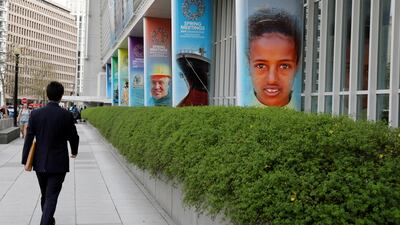The World Bank has cut its forecast for global growth amid a number of economic challenges, including a deepening crisis in Ukraine and the lingering impact of Covid-19 restrictions.
The lender lowered its growth estimates to 3.2 per cent from its earlier expectation of 4.1 per cent, President David Malpass said on Monday as the International Monetary Fund and the World Bank hold spring meetings in Washington.
"We begin the spring meetings facing severe overlapping crises. There's Covid-19, inflation and Russia's invasion of Ukraine," Mr Malpass said.
"I'm deeply concerned about developing countries. They're facing sudden price increases for energy, fertiliser and food, and the likelihood of interest rate increases. Each one hits them hard.
"These, plus the war in Ukraine and China's Covid-related shutdowns, are pushing global growth rates even lower and poverty rates higher."
The Covid-19 pandemic — which unleashed the worst recession since the Great Depression in the 1930s — is expected to weigh heavily on the growth prospects of developing and low-income countries.
The debt burden of the world’s low-income countries rose 12 per cent to a record $860 billion in 2020, according to a World Bank report last year. Even before the pandemic, many low and middle-income countries were in a vulnerable position, with slowing economic growth and public and external debt at elevated levels, the report said.
"People are facing reversals in development for education, health and gender equality. They're facing reduced commercial activity and trade. Also, the debt crises and currency depreciations have a burden that falls heavily on the poor," Mr Malpass said.
The World Bank is also set to approve a new 15-month crisis response package worth $170bn to cover April 2022 through June 2023 to help countries ride out the impact of the pandemic.
The bank expects to commit around $50bn of this amount in the next three months.
"This is a continued, massive crisis response given the continuation of the crisis. Helping this effort was the front loading of IDA19. IDA has been a key part of what has been a record scale-up. We'll be starting IDA20 on July 1, making $93bn available to IDA countries, the poorest," Mr Malpass said.

